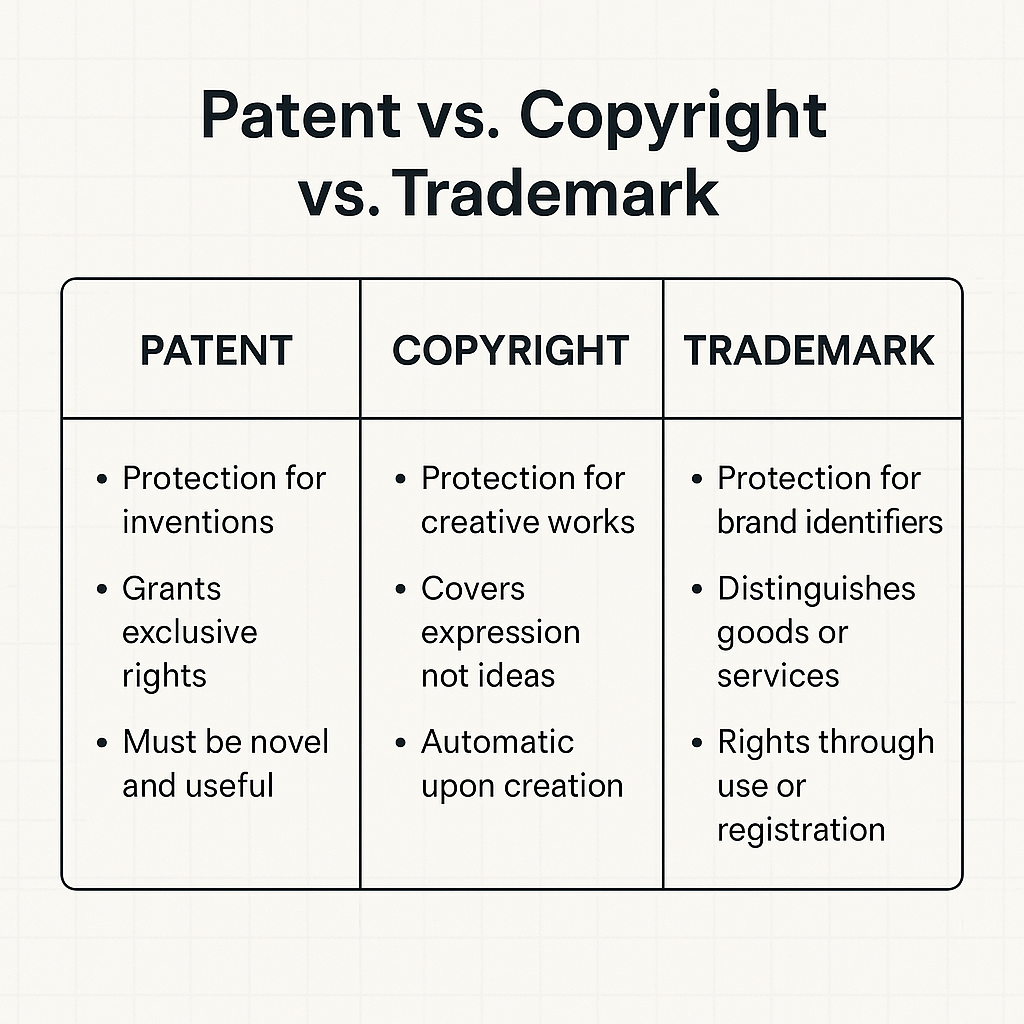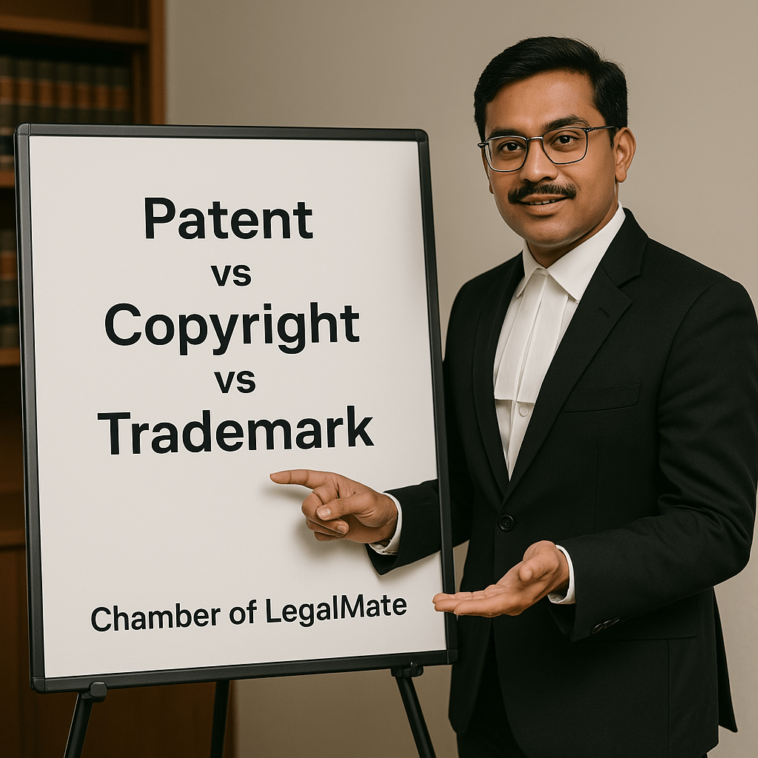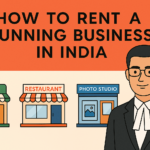Understanding the differences between Patent, Copyright, and Trademark is essential for protecting your intellectual property. This guide breaks down each form of protection, providing key information, examples, understanding Patent vs Copyright vs Trademark and relevant case laws.
What is a Patent?
A Patent is a form of legal protection granted to an inventor for a novel, useful, and non-obvious invention. It provides the exclusive right to the inventor to make, use, sell, or distribute the invention for a specific period, typically 20 yearsfrom the date of filing.
Types of Patents:
Utility Patents: Protects new and useful inventions or processes.
Design Patents: Safeguards the unique visual qualities of a product.
Plant Patents: Applies to new plant varieties produced asexually.
Key Features of Patents:
Must be new, non-obvious, and industrially applicable.
Subject to government examination.
Offers monopoly rights for commercial exploitation.
Time-bound: Expires after 20 years (in most jurisdictions).
Patent Example:
The technology behind the iPhone’s multi-touch screen was protected by patents filed by Apple Inc.
Relevant Case Law:
Novartis AG v. Union of India (2013): This case highlighted the significance of patents in the pharmaceutical industry, particularly regarding the patentability of new forms of known substances.
What is Copyright?
Copyright is the automatic legal protection given to the original creator of literary, artistic, musical, and certain other intellectual works. Unlike patents, copyright protection exists the moment the work is created, and does not require registration (although registering offers better legal standing in court).
Works Protected Under Copyright:
Books, articles, and poems
Music and lyrics
Movies and documentaries
Software code
Paintings, photography, and sculptures
Key Features of Copyright:
Protects expression of ideas, not the ideas themselves.
Typically lasts for the life of the author + 60/70 years, depending on the jurisdiction.
Grants the right to reproduce, distribute, display, and create derivative works.
Can be transferred or licensed to third parties.
Copyright Example:
J.K. Rowling owns the copyright to the Harry Potter series, which prevents unauthorized reproduction or adaptation of the content.
Relevant Case Law:
Indian Performing Right Society Ltd. v. Sanjay Dalia (2015): This case dealt with the issue of the performing rights of a musical composition, showcasing how copyright law is applied in India.
What is a Trademark?
A Trademark is a symbol, word, phrase, logo, or combination thereof, which is used to identify and distinguish the source of goods or services of one entity from another. It acts as a brand identity in the marketplace.
Types of Trademarks:
Word Marks: Names like “Nike” or “Amazon”.
Logo Marks: Apple’s bitten apple logo.
Sound Marks: Intel’s signature jingle.
Slogan Marks: “Just Do It”.
Key Features of Trademarks:
Helps consumers identify the source and quality of goods/services.
Renewable indefinitely as long as it remains in commercial use.
Enforceable against confusingly similar marks in the same category.
Valuable intangible asset for any brand.
Trademark Example:
The McDonald’s golden arches are trademarked globally and cannot be used by other food companies.
Relevant Case Law:
Cadbury India Ltd. v. ITC Ltd. (2009): This case involved the protection of the trademark “purple” for Cadbury’s chocolate packaging, establishing the distinctiveness required for a trademark.
Differences Between Patent vs Copyright vs Trademark

| Aspect | Patent | Copyright | Trademark |
|---|---|---|---|
| Protection Type | Inventions and processes | Original creative works | Brand names, logos, slogans |
| Eligibility | New, useful, non-obvious inventions | Original expressions of ideas | Distinctive identifiers of business |
| Term of Protection | 20 years (typically) | Life of author + 60/70 years | Can last indefinitely with renewals |
| Registration Needed | Yes (mandatory) | No (but registration recommended) | Yes (to obtain legal rights) |
| Jurisdiction | Country-specific | Country-specific | Country-specific |
| Examples | A smartphone technology | A novel, song, or painting | Coca-Cola name and logo |
Which One Do You Need?
The choice between patent, copyright, and trademark depends on the nature of your work:
If you have invented something technical, go for a Patent.
If you’ve created a book, video, code, or painting, choose Copyright.
If you’re building a brand, product name, or logo, register a Trademark.
In many cases, businesses may require all three forms of protection. For instance, a tech company may:
Patent its innovative technology,
Copyright its website content and software,
Trademark its logo and brand name.
Legal Implications and Enforcement
Understanding the distinctions also helps in legal enforcement. Each right is governed by different laws and enforcement mechanisms:
Patent infringement can lead to injunctions and monetary damages.
Copyright infringement often results in cease-and-desist orders, penalties, or lawsuits.
Trademark infringement can lead to confusion among consumers, causing brand dilution or loss of revenue, and warrants immediate legal action.
Proper registration with relevant authorities—like the USPTO, EUIPO, or Indian IP Office—helps in strong enforcement.
Global Considerations in IP Protection
Intellectual property rights are territorial, which means a patent or trademark filed in the U.S. does not automatically offer protection in India, UK, or any other country. Businesses must consider international filing mechanisms, such as:
Patent Cooperation Treaty (PCT) for patents.
Madrid Protocol for trademarks.
Berne Convention for copyrights.
This ensures a global layer of protection for your IP assets.
Conclusion: The Power of Proper IP Strategy
An effective intellectual property strategy is the foundation of innovation, branding, and creative success. Whether you are a startup, an artist, or a large corporation, protecting your intellectual assets is not just a legal necessity—it is a strategic business move.
By recognizing the differences and strengths of patents, copyrights, and trademarks, you empower your organization to safeguard innovation, build a strong brand, and avoid costly disputes. Always consult a professional IP attorney for guidance tailored to your needs.
To register a trademark or copyright in India, visit legalmateindia.com or talk to an LegalMate Business Expert.






